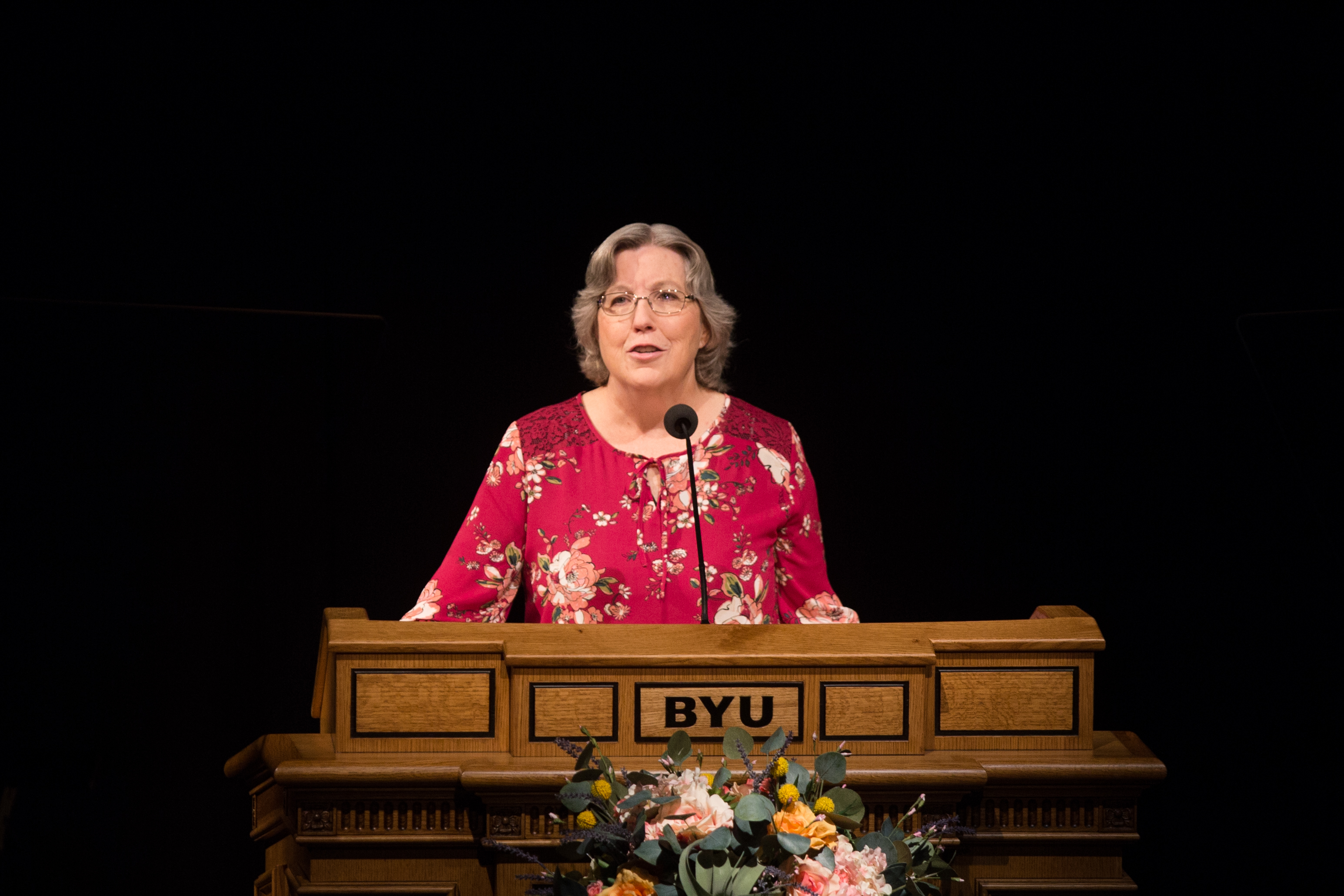
Professor of public management Professor Lori L. Wadsworth spoke about seeing others as children of God in a devotional address to students, staff and guests on July 31.
When her children were teenagers, she or her husband would say to them, “Remember who you are.” She wanted to arm them with the knowledge of their divinity whenever they left the home because she knew they would face challenges and difficult decisions.
“I believe that knowing of our divinity changes the way we view ourselves and influences our daily decision making,” she said.
As children of God, we each have a “single line” leading back to our Heavenly Father.
“The power of that single line can be accessed through prayer, scripture reading, church and temple attendance,” said Wadsworth.
Part of understanding our own divinity as a child of God is understanding that those around us are also children of a Heavenly Father.
“It doesn’t matter if they are just like you or vastly different from you — they are all children of our Heavenly Father,” said Wadsworth.
She shared several principles to help us treat others like children of God, beginning with avoiding judging others.
As Elder Utchdorf taught in a 2012 general conference, “When it comes to hating, gossiping, ignoring, ridiculing, holding grudges or wanting to cause harm, please apply the following: Stop it!”
Wadsworth invited us to ask ourselves if we are practicing his counsel in our own lives. “When we are tempted to judge another, do we just stop it?” she asked.
If we are to take Elder Utchdorf’s advice, we must stop judging “because as disciples of Christ, we need to see others as he sees them.”
Wadsworth also advised listeners to avoid contention and respect others’ opinions. She referenced a 2014 general conference talk about civility by Elder Oaks.
“We should love all people, be good listeners and show concern for their sincere beliefs. Though we may disagree, we should not be disagreeable,” Oaks said.
While “bashing” others with different opinions is commonplace, we must avoid the practice to have the Spirit in our lives, Wadsworth said. Even if we disagree with people, we must treat them with the respect they deserve as children of God.
“Rather than looking for differences between us and our brothers and sisters, we should be actively looking for commonalities that we can then use to build strong relationships of mutual respect and understanding,” said Wadsworth.
Another important way to respect others is by listening to them. She quoted the Greek philosopher Epictetus, who said, “We have two ears and one mouth so that we can listen twice as much as we speak.”
Wadsworth told a story about a man with a flat tire who approached a nearby farmhouse to borrow a jack. On his way there, he imagined the farmer might be angry and demand payment for the jack. When he finally approached the house, he angrily told the farmer he did not want the tool before the farmer even had a chance to speak.
This story illustrates that we cannot assume the intentions of another without listening to them. Part of treating our fellow mankind as children of God is being willing to serve them.
“As we provide service and show kindness to others, we immerse ourselves in loving and helping, rather than judging and contention,” said Wadsworth.
She also told a story about a woman in a difficult situation who asked those who may not understand her to “move in closer.”
“Our natural instinct might be to back up when we see people in difficult circumstances. Perhaps we don’t want to intrude on what seems like a personal matter, or we are unsure what to say or do. If this is the case, I challenge all of us to be brave and move in closer. Literally and figuratively stand with those who need us, link arms with those who are suffering,” Wadsworth said.
Wadsworth said that when she turned 50, she compiled a list of 60 things she wanted to do before turning 60. One was visiting each Utah national park, and another was driving on every major road in Utah and stopping to see the scenery.
When she took the time to slow down and appreciate the beauty around her, her perspective changed. “My mind and soul were edified, and my vision was increased,” she said.
She explained that life is like her experience: In all of our hurry and busyness, we might be missing out on the real purpose of life.
“Maybe we need to seek ways to slow down and look out the window of our life and then see the people around us,” she said.
If we can internalize these principles and treat others as children of God, “we will become more like him in the way we interact and respond to others, especially those who are different from us,” she said.
Wadsworth closed her address with one last piece of guidance: “During your time here at BYU, but also throughout all your endeavors in this life, remember who you are.”
The next devotional will be delivered by professor of ancient near eastern studies Eric Huntsman on August 7 at 11 a.m. in the de Jong concert hall.




